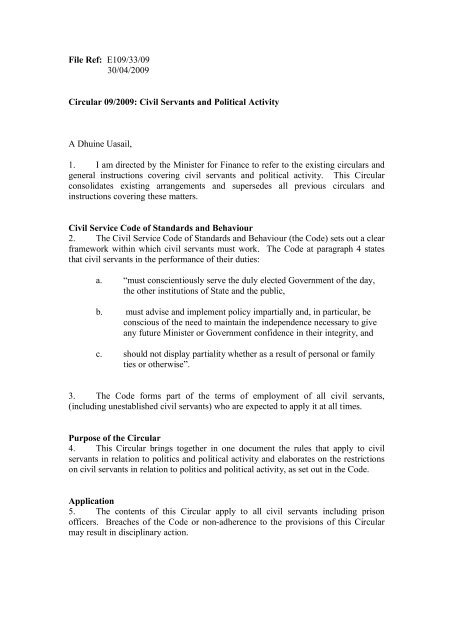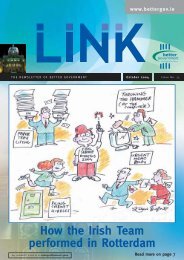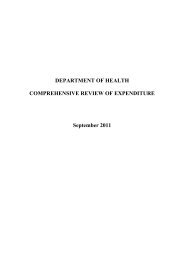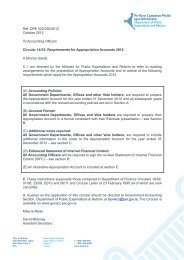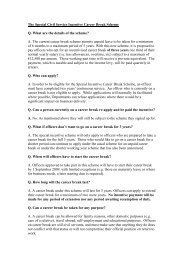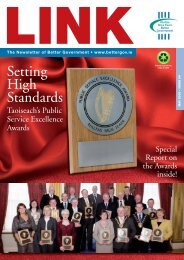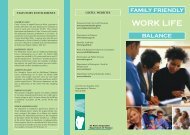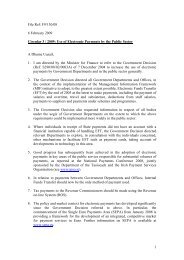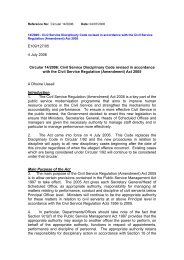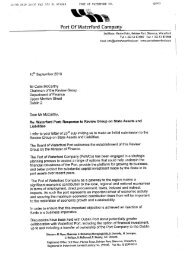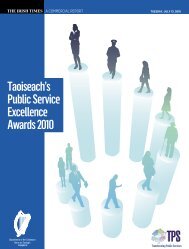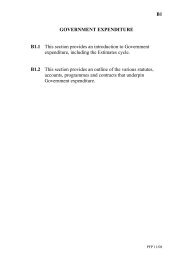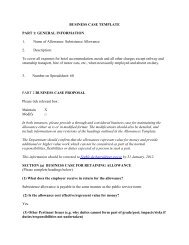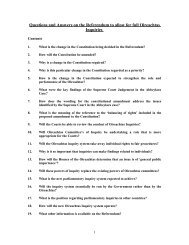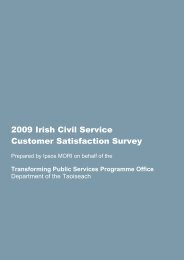Circular 09/2009 â Civil Servants and Political Activity - Human ...
Circular 09/2009 â Civil Servants and Political Activity - Human ...
Circular 09/2009 â Civil Servants and Political Activity - Human ...
- No tags were found...
Create successful ePaper yourself
Turn your PDF publications into a flip-book with our unique Google optimized e-Paper software.
File Ref: E1<strong>09</strong>/33/<strong>09</strong>30/04/20<strong>09</strong><strong>Circular</strong> <strong>09</strong>/20<strong>09</strong>: <strong>Civil</strong> <strong>Servants</strong> <strong>and</strong> <strong>Political</strong> <strong>Activity</strong>A Dhuine Uasail,1. I am directed by the Minister for Finance to refer to the existing circulars <strong>and</strong>general instructions covering civil servants <strong>and</strong> political activity. This <strong>Circular</strong>consolidates existing arrangements <strong>and</strong> supersedes all previous circulars <strong>and</strong>instructions covering these matters.<strong>Civil</strong> Service Code of St<strong>and</strong>ards <strong>and</strong> Behaviour2. The <strong>Civil</strong> Service Code of St<strong>and</strong>ards <strong>and</strong> Behaviour (the Code) sets out a clearframework within which civil servants must work. The Code at paragraph 4 statesthat civil servants in the performance of their duties:a. “must conscientiously serve the duly elected Government of the day,the other institutions of State <strong>and</strong> the public,b. must advise <strong>and</strong> implement policy impartially <strong>and</strong>, in particular, beconscious of the need to maintain the independence necessary to giveany future Minister or Government confidence in their integrity, <strong>and</strong>c. should not display partiality whether as a result of personal or familyties or otherwise”.3. The Code forms part of the terms of employment of all civil servants,(including unestablished civil servants) who are expected to apply it at all times.Purpose of the <strong>Circular</strong>4. This <strong>Circular</strong> brings together in one document the rules that apply to civilservants in relation to politics <strong>and</strong> political activity <strong>and</strong> elaborates on the restrictionson civil servants in relation to politics <strong>and</strong> political activity, as set out in the Code.Application5. The contents of this <strong>Circular</strong> apply to all civil servants including prisonofficers. Breaches of the Code or non-adherence to the provisions of this <strong>Circular</strong>may result in disciplinary action.
<strong>Civil</strong> <strong>Servants</strong> <strong>and</strong> Membership of the Dáil, Seanad <strong>and</strong> European Parliament6. Section 41(h) of the Electoral Act 1992 disqualifies from membership of theDáil a civil servant “who is not by the terms of his employment expressly permitted tobe a member of the Dáil”. Article 18.2 of the Constitution of Irel<strong>and</strong> states “A personto be eligible for membership of Seanad Éireann must be eligible to become amember of Dáil Éireann”. In relation to the European Parliament, Section 41 of theElectoral Act 1992, as amended by Section 11(2) of the European ParliamentElections Act 1997, disqualifies from membership of the European Parliament anyperson who is subject to any of the disqualifications applicable to membership of theDáil referred to in paragraphs (f) to (k) of Section 41 of the Electoral Act 1992.7. Arising from these legislative provisions the following rules apply to civilservants wishing to st<strong>and</strong> for election to either House of the Oireachtas or theEuropean Parliament:a. <strong>Civil</strong> servants are debarred from st<strong>and</strong>ing for election to either Houseof the Oireachtas unless expressly permitted to do so by the terms oftheir employment;b. <strong>Civil</strong> servants are debarred from st<strong>and</strong>ing for election to the EuropeanParliament unless expressly permitted to do so by the terms of theiremployment.8. Any civil servant seeking a seat in either House of the Oireachtas or theEuropean Parliament shall, when her/his intention to become a c<strong>and</strong>idate is formed,immediately notify the Head of her/his Department 1 . Unless alternative arrangementsare expressly stated in the terms of her/his employment, s/he shall resign her/his officewhen s/he is officially declared a c<strong>and</strong>idate for election or accepts nomination, or inany other manner announces her/himself, or causes her/himself to be announced, as ac<strong>and</strong>idate for election.Participation by <strong>Civil</strong> <strong>Servants</strong> in Local Elections9. The following provisions apply to civil servants regarding local elections:a. <strong>Civil</strong> servants in the craft, state industrial <strong>and</strong> manual grades <strong>and</strong>grades below clerical grades may st<strong>and</strong> for election to local authorities;b. <strong>Civil</strong> servants in the clerical grades <strong>and</strong> non-industrial grades withsalary maxima equal to or below the Clerical Officer maximum mayst<strong>and</strong> as c<strong>and</strong>idates at local election, subject to permission to do sobeing given by their Department. Departments must give such civilservants who are refused permission to take part in political activities,a statement of the reason for the decision;1 For “Department” read “Department or Office” throughout this circular
c. Special advisers <strong>and</strong> other personal appointees of Ministers, Ministersof State, Parliamentary office holders <strong>and</strong> the Attorney General,holding temporary unestablished positions may contest local elections;d. All other civil servants are completely debarred from st<strong>and</strong>ing forlocal elections, unless expressly permitted to do so by the terms oftheir employment.10. <strong>Civil</strong> servants who are members of Local Authorities may be given specialleave without pay, up to a maximum of 12 days per annum, to attend full meetings ofthe Local Authorities where the meetings are held during normal business hours.11. In addition, civil servants who are members of Local Authorities may be givenspecial leave without pay, up to a maximum of 5 days per annum, to attend furtherLocal Authority activities, other than meetings of the full public body, that take placeduring normal business hours.<strong>Political</strong> <strong>Activity</strong>12. The nature of a civil servant’s role is such that a civil servant must maintain areserve in political matters, in order to ensure confidence in the political impartialityof the <strong>Civil</strong> Service. The restrictions placed on civil servants in relation to politics<strong>and</strong> political activity are designed to ensure that a civil servant does not do anythingthat could give rise to a perception that his or her official actions are in any wayinfluenced or capable of being influenced by party political motives.13. <strong>Civil</strong> servants other than –a. <strong>Civil</strong> servants in the craft, state industrial <strong>and</strong> manual grades <strong>and</strong>grades below clerical grades,b. Clerical grades <strong>and</strong> non-industrial grades with salary maxima equal toor below the Clerical Officer maximum who have obtained permissionfrom their Department to engage in politics,c. Special advisers <strong>and</strong> the personal appointees of Ministers, Ministers ofState, Parliamentary office holders <strong>and</strong> the Attorney General holdingtemporary unestablished positions,d. Persons expressly permitted to do so by the terms of theiremployment,are prohibited from engaging in politics i.e. they may not contribute to public debate<strong>and</strong> may not support or oppose a c<strong>and</strong>idate or party either in writing, by public debateor by contribution to the media (e.g. letter writing to newspapers, contribution totelevision or radio programmes, discussions on the internet, etc.), except if required todo so as part of their official duties.
14. <strong>Civil</strong> servants, other than those in the exempted categories in paragraph 13must not speak in public on matters of local or national political controversy orexpress views on such matters in the media (including electronic media <strong>and</strong> the press)or in books, academic papers, articles or leaflets.15. <strong>Civil</strong> servants may engage in voluntary, local, community or sporting affairs,where that activity is not connected to, or does not conflict with, their official dutiesor is not connected to politics <strong>and</strong> the activity does not conflict with the need for civilservants to behave, <strong>and</strong> to be seen to behave, in a politically impartial manner.However officers should adopt a precautionary approach when dealing with the mediaor making any public comment about their activities. Because of the need for civilservants to avoid the perception that their comments may be influenced by partypolitical motives, where possible, they should notify the Personnel Officer in advanceof any public comment <strong>and</strong> comply with any restrictions required by the PersonnelOffice. Where it is not possible to notify the Personnel Officer, the onus is on theindividual officer to ensure that they do not say or do anything that could give rise toa perception of being influenced by party political motives.16. <strong>Civil</strong> servants who are permitted to engage in political activity should note thatthe unauthorised use of state resources constitutes a breach of the <strong>Civil</strong> Service Codeof St<strong>and</strong>ards <strong>and</strong> Behaviour (paragraph 11 of the Code refers).Position of Special advisers <strong>and</strong> the personal appointees of Ministers, Ministersof State, Parliamentary office holders <strong>and</strong> the Attorney General17. Following a Government Decision in July 1985, Personal Assistants <strong>and</strong>Special Advisers in Ministers’ offices are exempt from the general rules that restrictcivil servants in relation to political activity. Those who hold the positions ofPersonal Secretaries, <strong>Civil</strong>ian Drivers <strong>and</strong> any other personal appointees of Ministers,Ministers of State, Parliamentary office holders <strong>and</strong> the Attorney General may alsoengage in political activity <strong>and</strong> contest local elections. However, such persons are notpermitted to st<strong>and</strong> for election to either House of the Oireachtas or the EuropeanParliament unless permitted to do so by the terms of their contract.18. Such appointees are free to work in campaign offices during election periodssubject to the following arrangements:a. they must take annual leave to cover periods involved in campaignwork;b. they should remain in their Department <strong>and</strong> perform their duties in theusual manner, if not involved in campaign work;c. annual leave taken for the purpose of campaign work will beinterrupted when required to attend to official duties.
Use of property, services (including staff) <strong>and</strong>/or facilities for election purposeswhere the costs of same have been met out of public funds19. Departments need to ensure that staff are aware of the provisions of this<strong>Circular</strong> <strong>and</strong> of the most recent guidance from the St<strong>and</strong>ards in Public OfficeCommission (the Commission) concerning the use of property, services (includingstaff) <strong>and</strong>/or facilities for c<strong>and</strong>idates at Presidential, Dáil <strong>and</strong> European elections,where the costs of same have been met out of public funds. (The most up-to-dateguidance is normally contained in the Commission's most recent guidelines forelections. These guidelines are available on the Commission's websitehttp://www.sipo.gov.ie/en/ under Guidelines/Elections). The Commission can also becontacted for advice on this matter. Financial management systems should be in placefor the appropriate recording of expenditure for election purposes. It will be a matterfor the relevant agent <strong>and</strong> the c<strong>and</strong>idate, in consultation with the provider of theproperty, services or facilities, to determine the value of the usage for electoralpurposes <strong>and</strong> to account for this in the Election Expenses Statement.20. Some c<strong>and</strong>idates at an election who are already public representatives may berequired to communicate with their constituents during the election period. It isnecessary, therefore, where costs are being met from public funds, to differentiatebetween the use of property, services (including staff) <strong>and</strong>/or facilities in carrying outreasonable constituency business <strong>and</strong> the use of such material for electoral purposes.If, during an election period, such materials are used for the purpose of any form ofunsolicited communication to any of the electorate in the constituency, the materialswill be regarded as having been used for electoral purposes <strong>and</strong> the costs will have tobe accounted for as an election expense at their full commercial value. In that regard,the Commission is of the view that, where a new enquiry is raised with a c<strong>and</strong>idate(i.e. an enquiry which had not been raised with the c<strong>and</strong>idate prior to the election)while he/she is canvassing <strong>and</strong> facilities are used for the purposes of responding to theenquiry, the cost of which are met out of public funds, these facilities will be regardedas having been used for electoral purposes. This also applies to unsolicited materialissued by elected representatives, other than the c<strong>and</strong>idate, where the material eitherpromotes or opposes a c<strong>and</strong>idate or otherwise seeks to influence the outcome of theelection.21. Departments need to ensure that relevant staff are aware of the provisions ofthis <strong>Circular</strong> <strong>and</strong> of the most recent guidance from the Minister for the Environment,Heritage <strong>and</strong> Local Government concerning the use of property, services (includingstaff) <strong>and</strong>/or facilities for all c<strong>and</strong>idates st<strong>and</strong>ing at local election where the costs ofsame have been met out of public funds. It will be an offence for a c<strong>and</strong>idate toexceed the spending limits 2 <strong>and</strong> penalties will apply in the case of non-compliance. Itwill be a matter for the relevant agent <strong>and</strong> the c<strong>and</strong>idate, in consultation with theprovider of the property, services or facilities, to determine the value of the usage forelectoral purposes <strong>and</strong> to account for this in the Election Expenses Statement.2 Currently, in the case of the 34 County <strong>and</strong> City Councils, a sliding scale with four separate spendinglimits, based on the population within each individual electoral area, applies. Due to their differentadministrative responsibilities, a st<strong>and</strong>ard spending limit will apply to all 80 borough <strong>and</strong> towncouncils.
Briefings <strong>and</strong> other information sessions for Members of the Oireachtas.22. <strong>Civil</strong> servants may give technical briefings to Members of the Houses of theOireachtas on request in a variety of contexts, ranging from briefings for individualmembers representing the interest of constituents, to group briefings on complexnational policy issues. Attendance at such meetings should only occur where theSecretary General or Head of Office considers it appropriate. However, all Ministershave been advised that office holders should not request civil servants to conductbriefings in settings such as parliamentary party meetings, constituency branchmeetings or similar type meetings.Circulation23. The contents of this <strong>Circular</strong> should be brought to the attention of staff in yourDepartment. On appointment to Departments all new appointees should be given theopportunity to read this <strong>Circular</strong> <strong>and</strong> their attention should also be drawn to theprovisions of paragraphs 4 <strong>and</strong> 5 of the Code.Mise le meas,_________________Patricia ColemanDirectorTo: All Departments etc.


